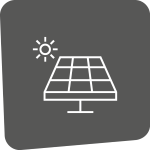At Haifa Group, we are dedicated to leading the way in sustainable agriculture, ensuring a healthy planet for today and future generations. Our business practices and products support plant health and enhance humanity’s ability to provide food security while minimizing our environmental footprint.
Our Key Initiatives:
Reduction of Production-related Greenhouse Gas Emissions (Scope 1+2) |
 | Haifa Group strives to implement sustainable practices, ensuring that our operations contribute to a healthier planet. accordingly, we are committed to reducing greenhouse gas emissions from production processes, specifically CO2 and N2O. We have set strategic initiatives and employ innovative solutions in our operations. Goal: Reduce production-related emissions by 20% per ton of product by 2030 Milestones: - 2024-2030: Optimize and innovate production processes to reduce N2O emissions from our Nitric Acid plant.
- 2025: Switch from Freon gas to ammonia as an in-process coolant.
- 2027: Increase renewable energy use to 25%, partly by constructing a solar field to supply energy to the Haifa Negev production facility.
- 2030: Achieve 50% renewable energy usage.
|
Reduction of Greenhouse Gas Emissions Along the Supply Chain (Scope 3) |
 | Our commitment to reducing emissions extends beyond our production processes. Thus, we adopt efficient technological solutions that enhance sustainability across our entire supply chain and further reduce greenhouse gas emissions. Ongoing Projects: New Railway Terminal: Located inside the Haifa Negev production site, replacing truck transport with rail, saving approximately 8 kg of CO2 equivalent emissions per ton, reducing our product shipping carbon footprint by 50% while alleviating traffic congestion. - Sea Transport Alternatives: Exploring sea transport options that reduce GHG emissions.
- Optimized Logistics: Improving warehouse locations to ensure efficient transportation of products to our customers and reduce emissions.
|
Waste Reduction |
 | We proactively decrease waste through an integrative approach that employs innovative strategies and technologies of reduction, recycling, and reuse. We aim to create a sustainable cycle where resources are utilized efficiently, and environmental impact is minimized. Goals: - Reach at least 60% recycled packaging materials by 2030
- Minimize waste throughout production processes
Actions Taken: - Reuse of over 7,400 pallets annually, after appropriate repair.
- Consuming organic residues containing alcohol in our production processes.
- Repacking off-spec products and directing them to suitable uses.
- Testing and implementing models for the collection, recycling, and reuse of packaging.
|
Shifting to Renewable Energy |
 | Increased use of renewable energy is part of our sustainability strategy. By prioritizing renewable energy sources, we aim to reduce our reliance on fossil-derived energy. Goal: Increase renewable energy usage to 50% by 2030 Actions Taken: Constructing a 35 hectare solar energy field to supply clean, renewable energy to our main production site. The field will be built above the site’s evaporation pools, making dual use of the area. - At Haifa France production, most electricity comes from nuclear sources, which are green due to minimal greenhouse gas emissions. Nuclear plants do not emit carbon dioxide during power generation, significantly reducing the carbon footprint.
- Haifa South America extensively utilizes hydroelectric energy sources in its operations in Brazil.
|
Promoting Sustainable Agriculture |
 | As the global population grows and the demand for food increases agricultural production must be conducted in environmentally responsible ways. Haifa’s commitment to plant health and best agriculture practices drives our dedication to providing holistic, highly efficient solutions for growers. We aim to support sustainable agriculture practices that enhance productivity while minimizing environmental impact. Goal: Provide solutions for an additional 7 million hectares of agricultural land, transitioning them from commodity fertilizers to specialty fertilizers. By doing so, we aim to reduce over 10 million tons of greenhouse gas emissions by 2030. How We Get There: - Digital Platforms: The NutriNet™ and MultiMatch™ tools help growers match nutrition to their crops’ exact growth needs, improving Nutrient Use Efficiency, maximizing yields, and minimizing waste. These tools also assess environmental and carbon footprints.
- Innovation: Develop new technologies for precision plant nutrition to improve efficiency and reduce environmental footprint.
- Technology Investment: Upscaling new methods and technologies for broader adoption by growers.
- Real-time Nutrient Analysis: A pioneering agri-technology that offers real-time nutrient analysis for crops through smartphone imaging. By quickly detecting deficiencies and providing tailored fertilization recommendations, Croptune™ optimizes fertilizer application, promoting healthy growth and maximizing yields.
|
Conducting Circular Production Methodologies |
 | Haifa Group strives to create a sustainable cycle of resource use across our operations, from innovative production processes that minimize waste to utilizing byproducts for secondary purposes. Our efforts include significant investments in technologies to ensure that our operations are not only efficient but also meet environmental stewardship. Current Developments: - BLUMONIA Plant: Use renewable energy from photovoltaic field for ammonia production. The CO2 emitted in this process will be captured and utilized to create CO2-based products.
- CO2 Capture: Building a CO2 plant will allow us to capture emissions from the production process and convert this gas into other products..
- Reuse 50,000 tons of sludge from wastewater treatment in the restoration of evaporation ponds, saving costs and minimizing waste.
|
Additional Initiatives
- Reuse 50,000 tons of sludge from wastewater treatment in the restoration of evaporation ponds, saving costs and minimizing waste.
By integrating these practices, Haifa Group ensures that every step of our production and operational processes supports a sustainable and thriving agricultural future.









